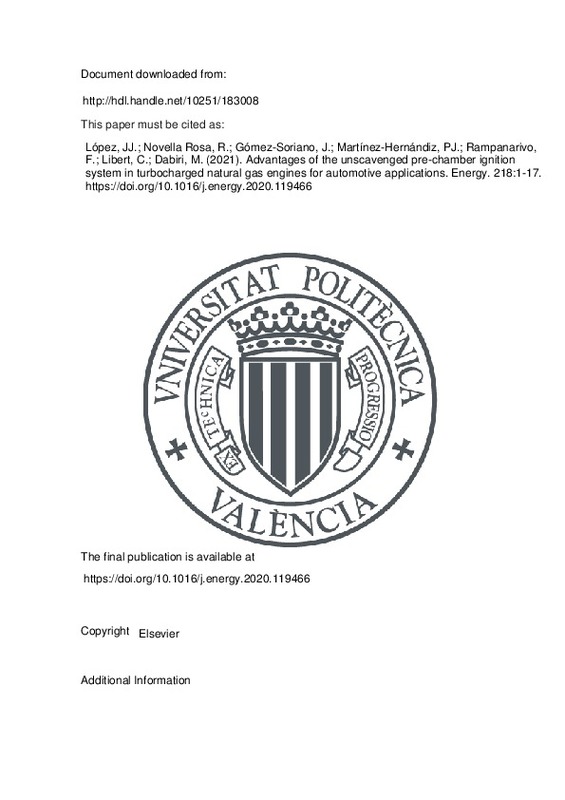JavaScript is disabled for your browser. Some features of this site may not work without it.
Buscar en RiuNet
Listar
Mi cuenta
Estadísticas
Ayuda RiuNet
Admin. UPV
Advantages of the unscavenged pre-chamber ignition system in turbocharged natural gas engines for automotive applications
Mostrar el registro sencillo del ítem
Ficheros en el ítem
| dc.contributor.author | López, J. Javier
|
es_ES |
| dc.contributor.author | Novella Rosa, Ricardo
|
es_ES |
| dc.contributor.author | Gómez-Soriano, Josep
|
es_ES |
| dc.contributor.author | Martínez-Hernándiz, Pablo José
|
es_ES |
| dc.contributor.author | Rampanarivo, F.
|
es_ES |
| dc.contributor.author | Libert, C.
|
es_ES |
| dc.contributor.author | Dabiri, M.
|
es_ES |
| dc.date.accessioned | 2022-05-31T18:04:35Z | |
| dc.date.available | 2022-05-31T18:04:35Z | |
| dc.date.issued | 2021-03-01 | es_ES |
| dc.identifier.issn | 0360-5442 | es_ES |
| dc.identifier.uri | http://hdl.handle.net/10251/183008 | |
| dc.description.abstract | [EN] In view of the increasing restrictions for CO2 mitigation, the evaluation of alternative fuels to ensure sustainability of transportation is becoming increasingly important. Since some of these alternatives can be refined from renewable sources, they are interesting from the perspective of both: the use of the current power-plants and the CO2 emission. In this sense, natural gas arises as an interesting propellant to substitute fossil fuels. Therefore, combining this fuel with specific combustion strategies can help to decrease the environmental footprint of transportation in the broadest sense. In this paper, an evaluation of the possible advantages of this combination has been conducted. The investigation has been carried out in a port fueled turbocharged spark-ignition engine, using compressed natural gas (CNG) and a passive pre-chamber ignition system. The effects of the CNG fuel properties on combustion have been analyzed and the global impact of using CNG for transportation has been appraised by means of the life cycle assessment. Results show that combustion of CNG refined by different renewable sources not only reduces the global CO2 emission but also can contribute to remove the existent pollution. In addition, they show an increase of the engine thermal efficiency when combining CNG and the pre-chamber ignition concept. | es_ES |
| dc.description.sponsorship | The work has been partially supported by the Spanish Ministerio de Economia y Competitividad through grant number TRA2017-89139-C2-1-R. P. J. Martinez-Hernandiz is partially supported by an FPI, Spain contract (FPI-S2-19-21993) of the "Programa de Apoyo para la Investigacion y Desarrollo (PAID-05-19)" of the Universitat Politecnica de Valencia. | es_ES |
| dc.language | Inglés | es_ES |
| dc.publisher | Elsevier | es_ES |
| dc.relation.ispartof | Energy | es_ES |
| dc.rights | Reconocimiento - No comercial - Sin obra derivada (by-nc-nd) | es_ES |
| dc.subject | Natural gas SI Engine | es_ES |
| dc.subject | Pre-chamber ignition | es_ES |
| dc.subject | Lean burn | es_ES |
| dc.subject | EGR-Diluted combustion | es_ES |
| dc.subject | LCA | es_ES |
| dc.subject.classification | MAQUINAS Y MOTORES TERMICOS | es_ES |
| dc.subject.classification | INGENIERIA AEROESPACIAL | es_ES |
| dc.title | Advantages of the unscavenged pre-chamber ignition system in turbocharged natural gas engines for automotive applications | es_ES |
| dc.type | Artículo | es_ES |
| dc.identifier.doi | 10.1016/j.energy.2020.119466 | es_ES |
| dc.relation.projectID | info:eu-repo/grantAgreement/AEI/Plan Estatal de Investigación Científica y Técnica y de Innovación 2013-2016/TRA2017-89139-C2-1-R/ES/DESARROLLO DE MODELOS DE COMBUSTION Y EMISIONES HPC PARA EL ANALISIS DE PLANTAS PROPULSIVAS DE TRANSPORTE SOSTENIBLES/ | es_ES |
| dc.relation.projectID | info:eu-repo/grantAgreement/UPV//FPI-S2-19-21993/ | es_ES |
| dc.relation.projectID | info:eu-repo/grantAgreement/UPV//PAID-05-19//Programa de Apoyo para la Investigación y Desarrollo/ | es_ES |
| dc.rights.accessRights | Abierto | es_ES |
| dc.contributor.affiliation | Universitat Politècnica de València. Departamento de Máquinas y Motores Térmicos - Departament de Màquines i Motors Tèrmics | es_ES |
| dc.description.bibliographicCitation | López, JJ.; Novella Rosa, R.; Gómez-Soriano, J.; Martínez-Hernándiz, PJ.; Rampanarivo, F.; Libert, C.; Dabiri, M. (2021). Advantages of the unscavenged pre-chamber ignition system in turbocharged natural gas engines for automotive applications. Energy. 218:1-17. https://doi.org/10.1016/j.energy.2020.119466 | es_ES |
| dc.description.accrualMethod | S | es_ES |
| dc.relation.publisherversion | https://doi.org/10.1016/j.energy.2020.119466 | es_ES |
| dc.description.upvformatpinicio | 1 | es_ES |
| dc.description.upvformatpfin | 17 | es_ES |
| dc.type.version | info:eu-repo/semantics/publishedVersion | es_ES |
| dc.description.volume | 218 | es_ES |
| dc.relation.pasarela | S\426034 | es_ES |
| dc.contributor.funder | AGENCIA ESTATAL DE INVESTIGACION | es_ES |
| dc.contributor.funder | Universitat Politècnica de València | es_ES |







![[Cerrado]](/themes/UPV/images/candado.png)

